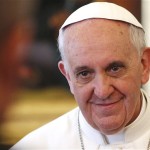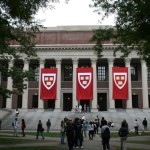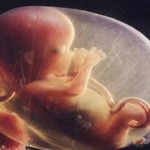Do ‘Religiously Knowledgeable’ Atheists Believe in God?
A new Pew study has found that a majority of Americans (53%) say they would be less likely to vote for a presidential candidate if that candidate self-identified as an atheist. Only 5% say that self-identified atheism would make them more likely to vote for a candidate. Perhaps Americans would think a bit differently if they knew about a secret that was hidden (until now) in the data for Pew's U.S. Religious Knowledge Survey. Recall what the media focused on when this was data was released:
- Los Angeles Times: “If you want to know about God, you might want to talk to an atheist. Heresy? Perhaps. But a survey that measured Americans' knowledge of religion found that atheists and agnostics knew more, on average, than followers of most major faiths.”
- Reuters: “They may not believe in God or gods but they know a thing or two about them. Atheists and agnostics topped a survey of religious knowledge among Americans released on Tuesday by the Pew Forum on Religion and Public Life.”
- New York Times: “Americans are by all measures a deeply religious people, but they are also deeply ignorant about religion. … Researchers from the independent Pew Forum on Religion and Public Life phoned more than 3,400 Americans and asked them 32 questions… Those who scored the highest were atheists and agnostics.”
However, digging a bit deeper into the data (available here) you’ll find that only 47% of adult atheists and agnostics in the United States are aware that an atheist is “someone who does not believe in God” and do not believe in God themselves. Additionally, the “knowledgeable” agnostics presumably appear in the 13% who are aware of the atheist definition and don’t know if God exists. Thus, six in ten answer in a manner that one might expect. Would Americans be more likely to vote for the 5% who are unaware that an atheist is someone who does not believe in God or of the even larger 35% of atheists and agnostics who are aware of the definition but who also say they believe in God?
Overall, 37% of self-identified atheists and agnostics in America believe in God regardless of awareness of the definition. This seems like a remarkably interesting finding that was not mentioned in the widely cited study of religious knowledge (...belief in God among atheists is something Pew has documented elsewhere as, for example, on page 5 of this report).
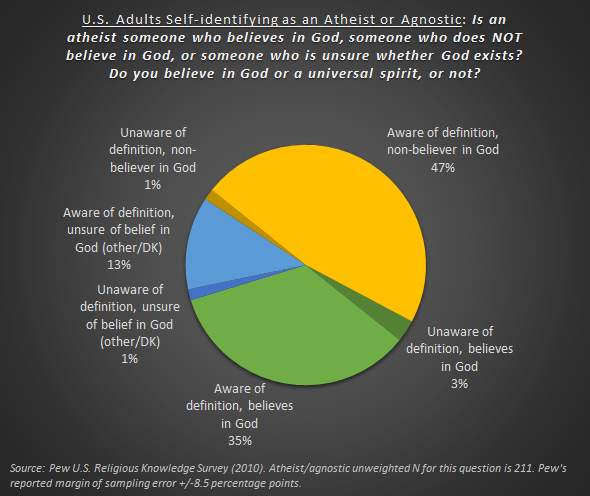
The Pew report compared average religious knowledge scores across different religious affiliation sub-groups. Self-identified atheists and agnostics did indeed outscore those of other religious affiliations. But there are indications—perhaps glimpses is a better term given sample sizes—that atheists and agnostics who don’t believe in God and/or never go to religious services are slightly less knowledgeable than other atheists and agnostics who are either open to believing in God or who go to religious services with some frequency.
The figure below isolates the 201 atheists and agnostics surveyed who know that an atheist is someone who “does not believe in God.” It shows the average total score on the religious knowledge quiz for those who 1) personally do not believe in God, 2) who are unsure of a belief in God, and 3) who believe in God. The non-believers score an impressive average of 20.6 out of 32 but those unsure of a belief in God (24.2) and those who believe in God (21.0) score even higher, on average.
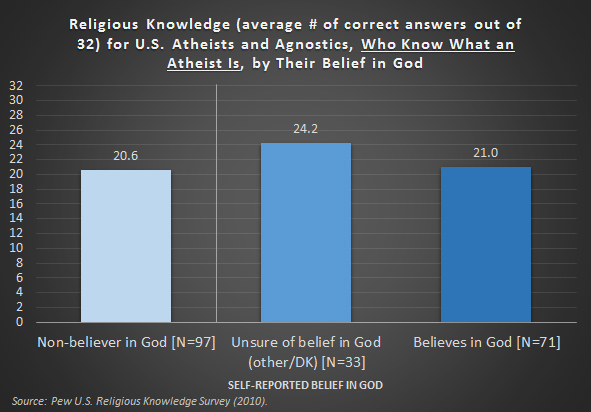
Among the broader population of atheists and agnostics surveyed (independent of their knowledge of what an atheist is or their belief in God), those who go to religious services with some frequency get more correct answers on the religious knowledge quiz than those who never attend these services.
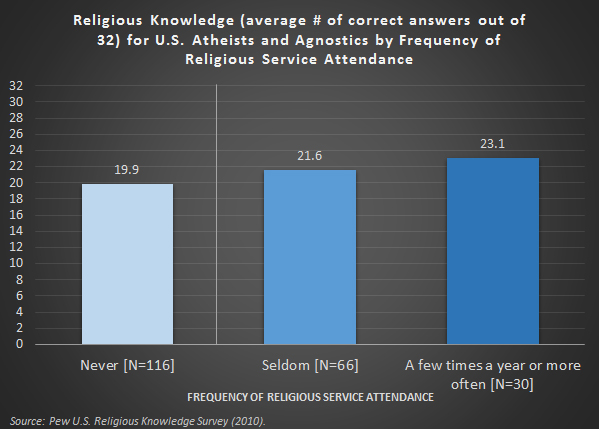
It makes sense that atheists and agnostics who go to religious services might be more knowledgeable about religion because they hear religious content there. But should those open to belief in God or those attending religious services also be more informed about science? The survey included a series of questions that measured scientific knowledge. As shown in the figures below, 97% of atheists and agnostics who claim not to believe in God know that Charles Darwin developed the theory of evolution, while other self-identified atheist and agnostic respondents were less likely to get this correct. Yet for all other scientific questions, those self-identified atheists and agnostics open to belief in God, or who believe in God, were more likely than non-believers to correctly answer. The second figure shows that those with some religious service attendance were more likely than those who never attend to answer each of the scientific questions correctly.
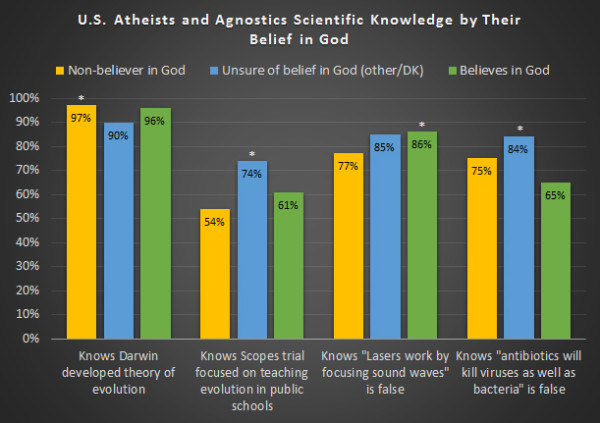
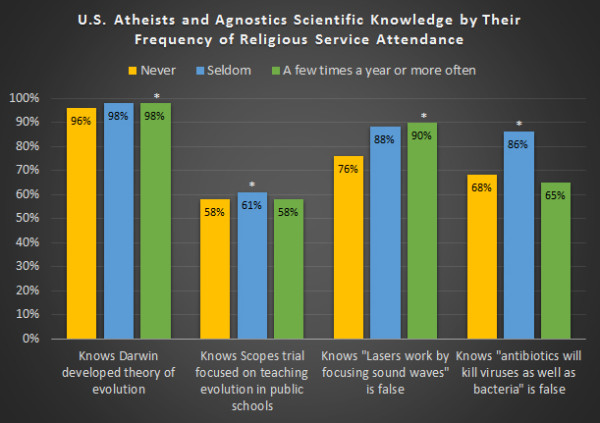
In the past, I've noted how atheists have among the lowest retention rates in the United States (defined as children raised as atheists self-identify as such as adults.) This generated a lot of discussion and a follow-up post detailing the many differences between the much larger and growing group of “Nones” (14% of U.S. adults with a “nothing in particular” religious affiliation) from those self-identifying specifically as atheists or agnostics (2% and 3% of U.S. adults, respectively).
I assume the above analysis may lead to some questions as well:
Q: Is this statistically valid? Just more than 200 atheists and agnostics were interviewed.
A: I did not create the sample nor conduct the survey. Pew did. Yet that didn't stop many in the news media from making much out of the conclusion, “If you want to know about God, you might want to talk to an atheist.” Those headlines were based on this very same, small sample. If the results above regarding the percentages of atheists and agnostics who know the definition of an atheist or who believe in God are “invalid,” then so is the finding that atheists and agnostics are the most religiously knowledgeable.
Recall that Pew also included even smaller sub-groups in its analysis that made news (e.g., 117 Hispanic Catholics were interviewed and reported on.) Small sub-groups are generally not uncommon in survey reports and can be found in other recent Pew research). The margins of error are, in my opinion, quite high. But then again I am just pointing to a source that made a lot of news, and noting that there is another story in the data which I think deserves exploration in future studies with larger sample sizes.
Q: If Pew didn’t mention any of this it must not be important. Why should I trust any of this?
A: Pew doesn’t mention many results in reports that one can find in their data. No one can completely describe all the possible relationships in a data set—especially when one is under a deadline to produce a summary report when the data are fresh. Greg Smith, who worked on this study, is, in my opinion, one of the leading religious researchers in the country. Yet, it would be unrealistic to expect even the best researchers to uncover every interesting finding in their data. Often they spend years examining and publishing out of the same data set before it is fully explored. It is also the case that Pew seems to have a very direct reporting style. They present topline and sub-group results in reports and do not venture extensively into other aspects or connections in their data. Thankfully, Pew provides their data to researchers to study and publish with the data further.
Q: I don’t trust CARA as a Catholic research center. What do you know about atheists?
A: When we noted the low retention rate for atheists someone replied:
"These were apparently culled from raw data supplied to CARA. They should perhaps then be taken with a grain of salt, as CARA is religiously affiliated, but we'll accept them as is."
There is always the fallback of CARA or Georgetown being Catholic institutions, but that has nothing to do with whether the date had "too small an N” or “Pew didn’t report it”. It’s nice to see we still get the benefit of the doubt by the commenter quoted above. The Catholic Church certainly listens to and learns from atheists. I would hope atheists could fathom accurate and unbiased research coming from an academic, religiously-affiliated center staffed by social scientists. In the end, math works the same for anyone, regardless of religious affiliation (and again the data are available for anyone to download and examine themselves).
Q: Should Pew include atheists who believe in God as "real atheists" in its studies?
A: This is the standard in both academic and non-academic survey research. Self-identity is always used. Survey researchers find all kinds of oddities in polls such as “very liberal” Republicans, Catholics who do not believe in God, or "Nones" who are born-again Evangelicals. The world is complex and no one has a monopoly on defining membership in the “atheist” community.
Q: Why blame reporters for misconceptions when all they have are the research reports?
A: Reporters should make a greater effort to skeptically depart from the press releases. Increasingly the news people follow, discuss, and trust is data-driven (see for example FiveThirtyEight, Vox, The NY Times Upshot). Good reporters of the future will be those who can engage the data.
In my own discussions with journalists I have really appreciated Jerry Filteau and Fr. Thomas Reese, SJ (also a social scientist). On a number of occasions, interviews with them have led me to go back and re-examine some facet of the data. Both look for more than what is in the report and start with a skeptical or questioning point-of-view. They are the types of journalists that I can say have made me a better social scientist.
Researchers should do more to ensure misconceptions are not being made by omissions in their reports. Too often religious research for media and public consumption seems to be more of an impressionist painting than a high-definition photograph. I think it is our responsibility to note all the quirks we find—even when these may detract from the headline narratives. Reality is complex, important, and beautiful (most of the time). Thanks to Pew, I am now confident that there really are knowledgeable atheists who know what an atheist is but who also believe in God and go to Church a few times a year (although few people are aware of this group). The world is a big place and there is room enough for everyone in the portraits we paint with data.
Related Posts
Note: Our goal is to cultivate serious and respectful dialogue. While it's OK to disagree—even encouraged!—any snarky, offensive, or off-topic comments will be deleted. Before commenting please read the Commenting Rules and Tips. If you're having trouble commenting, read the Commenting Instructions.






